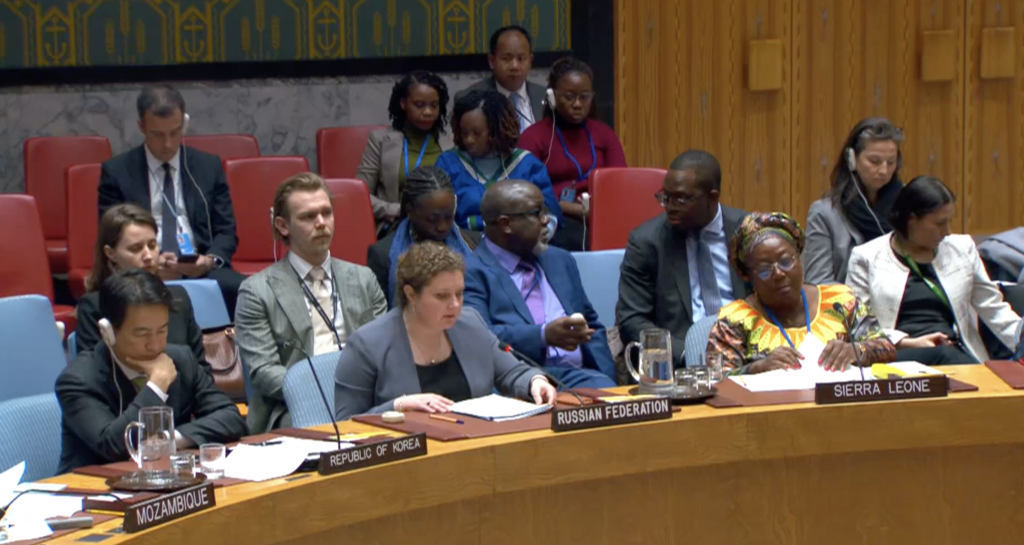Statement by Deputy Permanent Representative Anna Evstigneeva at UNSC open debate "Promoting Conflict Prevention – Empowering All Actors Including Women and Youth"
Mr.President,
We thank USG for Political and Peacebuilding Affairs, Rosemary DiCarlo, the Permanent Representative of Brazil and Chair of the Peacebuilding Commission Sérgio França Danese, and other briefers for their insights. Conflict prevention is clearly the main task of the Security Council under the Charter of the United Nations. Despite the fact that the planet has so far managed to avoid a new large-scale war, the world is in the deepest crisis in decades, which manifests itself through erosion of the international security system, the loss of trust among key players and the escalation of conflicts around the globe. In many ways, the unfolding processes are signs of the breakdown of the unipolar world, which must be replaced by a new world order. What it is going to be depends on us.
Secretary-General's "New Agenda for Peace" calls on member states to shape the international system by recovering trust and building solidarity, by making fuller use of the tools of diplomacy and political dialogue. Conflict prevention is of paramount importance.
While we fully support these noble aspirations, we cannot fail to note a certain discrepancy between the real situation and the declared intentions, which in our view reduces the effectiveness of the United Nations’ efforts in this area.
We all say that national plans and priorities should stand at the center of preventive and peacebuilding actions. However, donor countries have a direct influence on where funds are allocated. As a result, money is often spent on funding the priorities of Western donors rather than the real needs of the recipient countries. This includes the "securitization" of climate agenda, as well as the bias towards political and human rights aspects of women’s and youth agendas. At the same time, not enough attention is paid to real factors of instability, such as the socio-economic situation of the population, which includes women and youth as vulnerable groups.
Instead, the approach is being promoted that some human rights, gender, and climate-related measures serve as "universal indicators" of conflict that international officials should be guided by when determining the need for preventive action by the UN. Such an approach is fraught not only with a violation of the division of labor between the Security Council and other UN bodies, but also with increased risks of abuse and undue pressure on sovereign states under the guise of the United Nations.
Unfortunately, such intrusive attitudes have implications for the interaction of UN presences with host states. Quite often, a lack of understanding of host states’ political and peacebuilding priorities, “flirting” with civil society and NGOs (to the detriment of engagement with governments) triggers a crisis of communication between international officials and the country's authorities. In some cases, the UN manages to regain the trust of governments, while in others, the unwillingness to adopt a flexible and balanced approach leads to a breakdown in relations. Naturally, this is not conducive to resolving and preventing recurrence of conflicts.
No one can tell sovereign governments how to build their states, prevent conflict, organize legal system, or what percentage of women to include in political processes. Such an approach is a relic of the colonial past and cannot be the basis for truly effective prevention efforts.
The role of the United Nations and the international community as a whole is to supports states that independently determine (and bear primary responsibility for) strategies for responding to security challenges within their national borders.
Mr.President,
Speaking of the special emphasis of this discussion on strengthening the role of women and young people, Russia fully shares the view that women and youth can and do contribute immensely to the work of United Nations bodies and agencies, including in conflict prevention and settlement.
At the same time, we note that such attributes as age and gender can in no way be determining factors for the involvement of individuals in the decision-making processes, especially on such sensitive issues as maintenance of peace and security. What matters the most is professional knowledge and skills. Neglecting that aspect in favor of ostentatious diversity is unacceptable, because it will put people’s lives at risk.
Another important aspect is the lack of an intergovernmentally agreed definition of youth. As we know, this age category partially includes persons under 18 years of age, i.e., those whom Convention on the Rights of the Child defines as children. We believe that it is justified to shield young people from any political activity until they reach adulthood because of their physical and mental immaturity. In that regard, it is necessary to take efforts to counter the instrumentalization of young people and attempts to present the interests of certain political groups as the "vision of the younger generation".
Finally, in the context of international efforts to maintain peace and security, priority should be given to combating poverty, unemployment and social exclusion, the negative effects of which affect women and young people disproportionately more than the rest of the population and are at the root of social instability.
Thank you.
